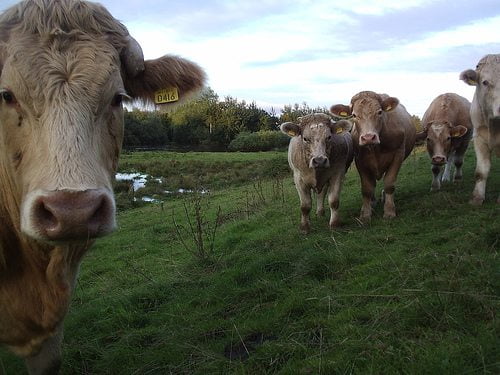

Environment
Tax meat to tackle climate change, say scientists
Meat should be taxed to dissuade people from eating it, therefore reducing the environmental impact of farming livestock, scientists have said.
The digestive systems of ruminants – animals that ferment food in a specialised stomach prior to digesting it, such as sheep and cattle – are the biggest human-related source of methane emissions.
When released into the atmosphere, methane is a potent greenhouse gas, producing around 21 times as much warming as carbon dioxide.
Methane from livestock alone adds up to around 7.1 gigatonnes per year, or 14.5% of all human-caused greenhouse gas releases, according to the UN Food and Agriculture Organisation. Scientists have estimated that methane is responsible for 20% of the enhanced greenhouse effect.
In a new study, published on Friday in the journal Nature Climate Change, researchers suggest one of the most effective ways to limit climate change would be to reduce populations of ruminant livestock.
“We clearly need to reduce the burning of fossil fuels to cut CO2 emissions. But that addresses only part of the problem. We also need to reduce non-CO2 greenhouse gases to lessen the likelihood of us crossing this climatic threshold,” William Ripple of the College of Forestry at Oregon State University, one of the study’s authors, explains.
The study concludes that introducing a tax, or some kind of emission-trading scheme, on livestock’s emissions could be the most effective way to do this.
“Influencing human behaviour is one of the most challenging aspects of any large-scale policy, and it is unlikely that a large-scale dietary change will happen voluntarily without incentives,” it says.
Many scientists and leading climate change experts have previously suggested that encouraging the uptake of a vegetarian diet could provide a boost to the battle against climate change.
A study by Small World Consulting, published in 2012, found that if everyone in the UK became vegetarian, it would have the same effect on the environment as taking half of the country’s cars off the road.
In October, former World Bank chief economist Lord Stern suggested that eating meat could even become as socially unacceptable as drink driving.
“People change their notion of what is responsible. They will increasingly ask about the carbon content of their food,” he said.
Further reading:
Study says US emitting more methane than government estimates
The Pig Idea: campaign looks to pigs to tackle food waste
Study outlines possibility of sustainable livestock
Sustainable agriculture can help tackle climate challenges
Government should be ‘reinforcing a sense of urgency’ on sustainable food


 Environment12 months ago
Environment12 months agoAre Polymer Banknotes: an Eco-Friendly Trend or a Groundswell?

 Features11 months ago
Features11 months agoEco-Friendly Cryptocurrencies: Sustainable Investment Choices

 Features12 months ago
Features12 months agoEco-Friendly Crypto Traders Must Find the Right Exchange

 Energy11 months ago
Energy11 months agoThe Growing Role of Solar Panels in Ireland’s Energy Future




























